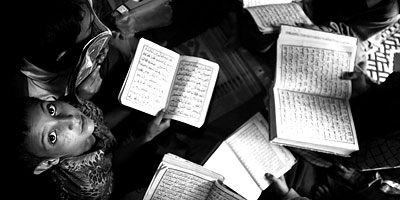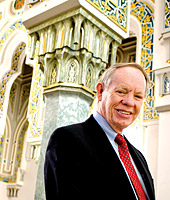Religion as a Catalyst for Peace
The Success of Faith-Based Diplomacy
 ICRD works to reform Pakistan’s madrasas by giving their leaders ownership in the process and by reminding them of the educational achievements of their past. ICRD works to reform Pakistan’s madrasas by giving their leaders ownership in the process and by reminding them of the educational achievements of their past.
By Douglas M. Johnston, President and Founder of the International Center for Religion and Diplomacy
Two years ago, a young lady from a village in Balochistan — the “hot zone” of Pakistan near the Afghan and Iranian borders — was caught talking on her cell phone at 2 a.m. with a young man from another village. For this violation of tribal custom, the village elders decided that she should die, and that the boy should lose his nose and ears.
When he learned of this, a local madrasa (religious school) leader from the girl’s village felt compelled to intervene. He had participated in a training workshop sponsored by the International Center for Religion and Diplomacy (ICRD) —
a Washington, D.C.-based non-governmental organization (NGO) — and
decided to put its ideas into action.

A member of The Falls Church
in Falls Church, Virginia, Douglas Johnston cultivated his interest in religion and conflict resolution during extensive involvement with the
National Prayer Breakfast.
He is pictured at the Islamic
Center in Washington, D.C.
|
With considerable trepidation, the madrasa leader sought permission from the elders to mediate the situation on the basis of Qur’anic principles. By pointing out that the Qur’an has no restrictions against a woman talking to a man, and by referring to passages in the Qur’an that encourage the peaceful resolution of differences, he was able to resolve the situation without anyone being harmed. In other words, religion triumphed over tribalism in a context where it is often difficult — even for Muslims — to determine where one ends and the other begins.
Religion, which is often viewed as a source of conflict in the world, has virtually been ignored by politicians as a tool of diplomacy and conflict resolution. The mission of ICRD is to address identity-based conflicts that exceed the reach of traditional diplomacy by incorporating religion as a part of the solution. These are conflicts that typically include an ethnic, tribal, or religious dimension.
Billions of dollars are spent to address the symptoms of these intractable problems with very little targeted at their underlying cause. ICRD is about “cause” and, as such, has as its highest priority the task of preventing conflict rather than dealing with its consequences after the fact.
Capitalizing on the positive role that religious leaders and institutions can play in building trust and overcoming differences is a trademark ingredient of the Center’s approach. By linking religious reconciliation with official or unofficial diplomacy, ICRD has created a new synergy for peacemaking that is promoting stability and enhancing global peace.
The workshop attended by the madrasa leader who resolved the tribal dispute was one of a series that ICRD has sponsored over the past four years in its effort to reform the religious schools of Pakistan, including those that gave birth to the
Taliban. These schools have a glorious history and from the Middle Ages through the 16th century were the peaks of learning excellence in the world. Indeed, it was European exposure
to them that led to the creation of our own university system.
In reaction to colonialism, however, madrasas purged themselves of all disciplines that they identified with the West — to the point where most of them today limit their focus to rote memorization of the Qur’an and the study of Islamic principles.
ICRD’s goals in this initiative have been twofold: (1) to expand the curriculums to include the physical and social sciences, with a particular emphasis on religious tolerance and human rights (especially women’s rights); and (2) to transform the pedagogy in order to promote critical-thinking skills among students.
The latter is particularly important. Because Pakistani students memorize the Qur’an in Arabic, and their own language is Urdu, they don’t really understand what it means. This makes them particularly vulnerable to local militants who misappropriate Islamic scripture to recruit these students to their cause. With no ability to challenge or question, they are very easy prey.
ICRD’s success to date stands in stark contrast to the failure of past attempts by the Pakistani government to reform these schools. Because madrasas are independently funded, their leaders have been able to resist government reforms, which they fear will lead to a loss of independence and to the possible secularization of their curriculums. ICRD, on the other hand, has been able to conduct the project in such a way that the madrasa leaders feel it is their reform effort and not something imposed from the outside (which means they have significant ownership in the process). ICRD also inspires them with their own heritage by reminding them periodically of the numerous pioneering breakthroughs in the arts and
sciences — including religious tolerance — that took place under Islam a thousand years ago. Once madrasa leaders begin to internalize this, they start walking a little taller and begin thinking that perhaps they can do better through curriculum reform and improved teaching methods.
Another country in which ICRD has practiced faith-based diplomacy is Sudan. Nine years ago, the Center began working in the North of that country to persuade the Islamic regime to take steps toward peace that they might otherwise not take in their long-running civil war with the Christian and African Traditionalist South. This eventually led — among other initiatives — to the establishment in 2003 of the Inter-religious Council, which brings top Christian and Muslim religious leaders together on a monthly basis to surface and resolve their problems. In addition, a Committee to Protect Religious Freedom was formed under the auspices of this council.
At the same time, ICRD worked behind the scenes to engage the Bush Administration in pressuring both sides to reach a peace agreement. That engagement, in addition to the efforts of many others, eventually paid off. After 21 years of
conflict, leaving more than two million dead and four million displaced, the struggle finally came to an end.
This particular conflict had resulted from the breakdown of a peace agreement between the North and the South in 1972 that ended an earlier 16-year civil war following Sudan’s transition
to independence in 1956. The hope is that structural initiatives like the Inter-religious Council and the Committee to Protect Religious Freedom can help ensure that a second peace will be lasting in nature.
The Inter-religious Council’s accomplishments to date have been impressive. In just the first few months of its existence,
it achieved more in the way of concrete measures to benefit Christians than the churches had been able to achieve over the previous 10 years working on their own.
The remarkable aspect of all of this is that it took place
within the context of an Islamic dictatorship. Not only did the Islamic regime agree to the formation of an independent council that has as part of its mandate holding the government accountable for its religious policies, but it also agreed to a leader for
the Council who had been a constant thorn in the regime’s
side ever since it seized power in a coup in 1989. Further, the
regime made a commitment to take the Council’s recommendations seriously.
Darfur (which is an internal Muslim conflict) notwith-
standing, the Sudanese government has thus far honored that
commitment — to the tune of more than $500,000 in funds
and land for the building of new churches and for providing
restitution for the past seizure of church properties.
ICRD’s activities, which take place in some of the world’s toughest neighborhoods (including Kashmir, Iran, Afghanistan, and the Middle East) are motivated by Matthew 5:9 and are first and foremost a witness by example. At times, however, they extend beyond that.
For example, in presentations to administrators and senior faculty at two madrasas with clearly established ties to terrorism, I identified myself and two board members who accompanied me as followers of Jesus, who are committed to the reconciling principles that he taught. Reciting relevant passages from the Qur’an and acknowledging the deep reverence that Muslims also hold for Jesus, I invited the madrasa leaders to join with us in building relationships based on reconciliation and a faith-based respect for one another that would allow all concerned to live in peace. The message was well-received, with one madrasa leader reacting by smiling, putting his hand over his heart, and proclaiming, “You have made me very happy. We thought that all Americans hated us.”
Because of the war in Iraq and the fact that Lebanon was under attack by Israel at the time, there was considerable rage
“in the air” concerning U.S. foreign policy. By the conclusion of the visit, however, that rage had been converted to a genuine spirit of acceptance. As we returned to the States, transiting London at the peak of a major bomb scare, it was clear that the Lord had been with us every step of the way.
Based on the Center’s experience to date, it is clear that respectful engagement is the most effective approach for resolving differences between people. Just as setting a counter-fire is often the best antidote to a blaze that is raging out of control, so too does religious reconciliation offer that same potential with respect to religious extremism. In a context where religious legitimacy trumps all, the best antidote for bad theology is good theology.
The practice of faith-based diplomacy is not without its challenges. It requires a special set of skills, and it is physically, emotionally, and psychologically draining. It also involves no small degree of risk. More than a few religiously motivated peacemakers have paid the ultimate price for their efforts. But despite the risks, and despite whatever discomfort one may feel in navigating the relatively uncharted waters of religious engagement, the stakes are simply too high not to give it our best effort. Only time will tell if we are up to the task.
Douglas M. Johnston holds a Ph.D. in political science from
Harvard University and has had a broad range of executive experience in government, academia, the military, and the private sector — starting with 10 years serving on submarines. At the age of 27, he was the youngest officer in the U.S. Navy to qualify for command of a nuclear submarine. Among his assignments in government, Johnston was director of policy planning and management
in the Office of the Secretary of Defense, and deputy assistant
secretary of the Navy. Before founding ICRD, he served as executive vice president and chief operating officer of the Washington, D.C.-based Center for Strategic and International Studies. He
has edited and authored several books, including Religion, The Missing Dimension of Statecraft (Oxford University Press, 1994)
and Faith-based Diplomacy: Trumping Realpolitik (Oxford University Press, 2003).
Return to top
Back to Features Home
|